Thomas James Richards, Diaries, Transcript Vol. 1, 26 August 1914 to 24 April 1915 - Part 12
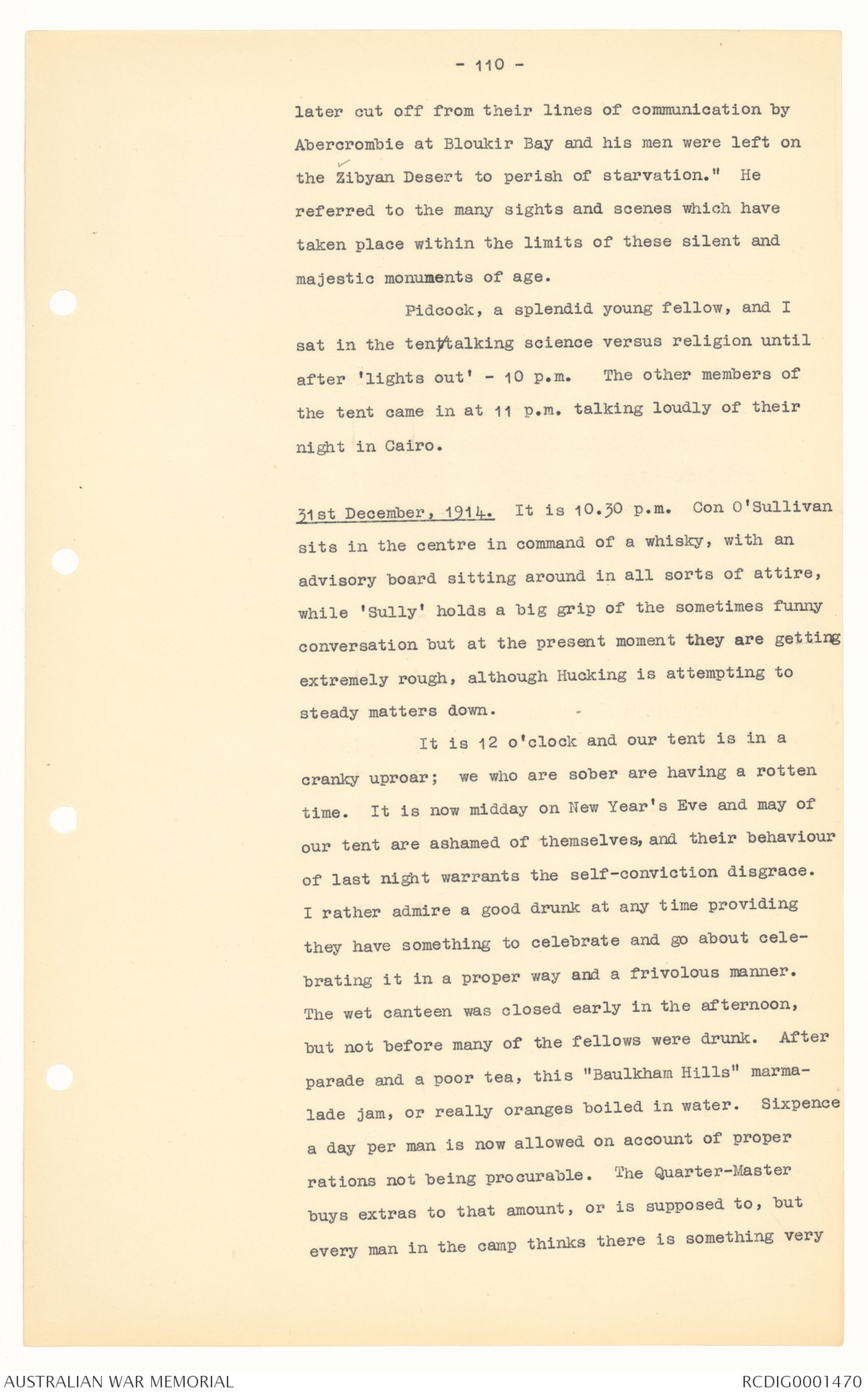
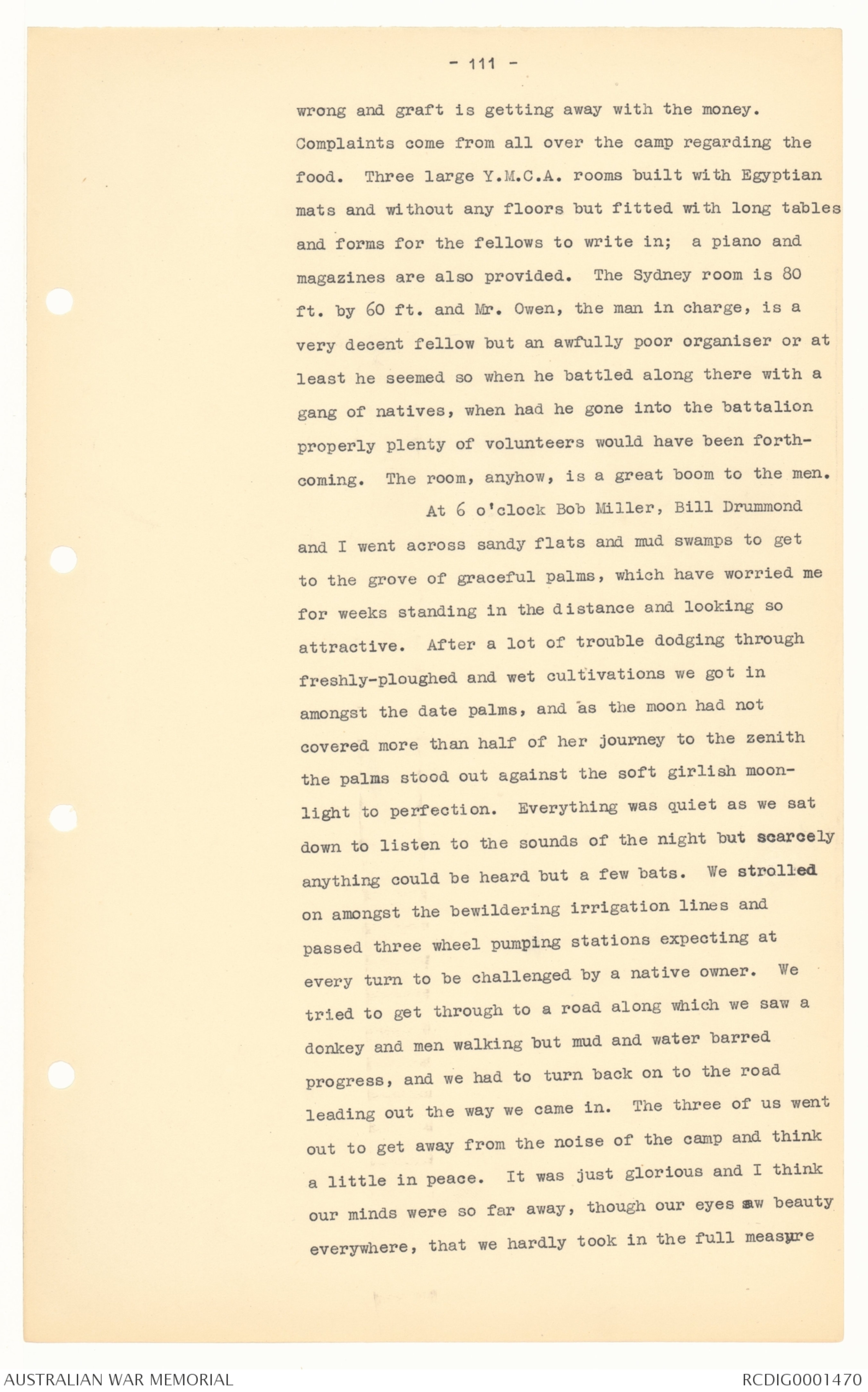
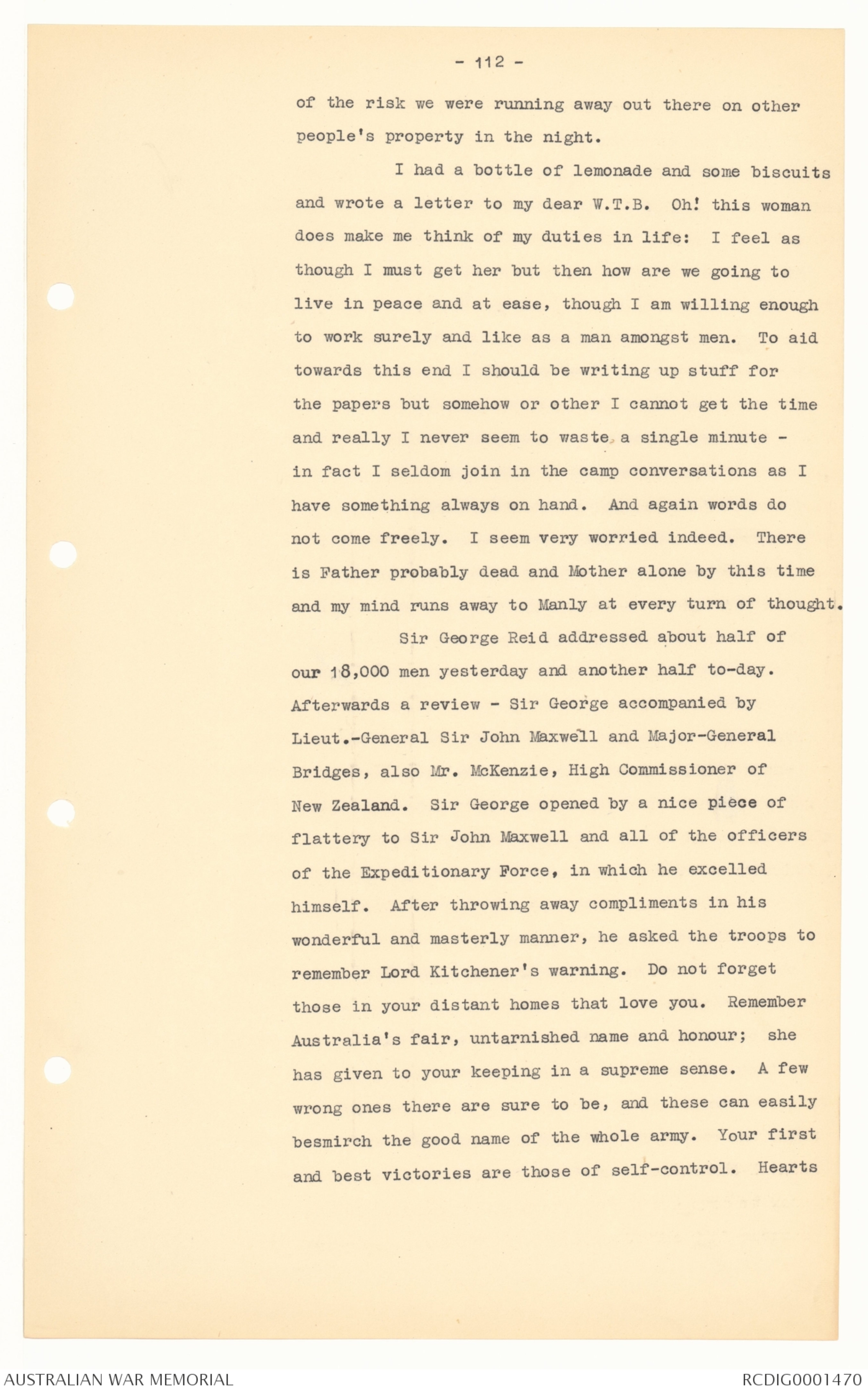
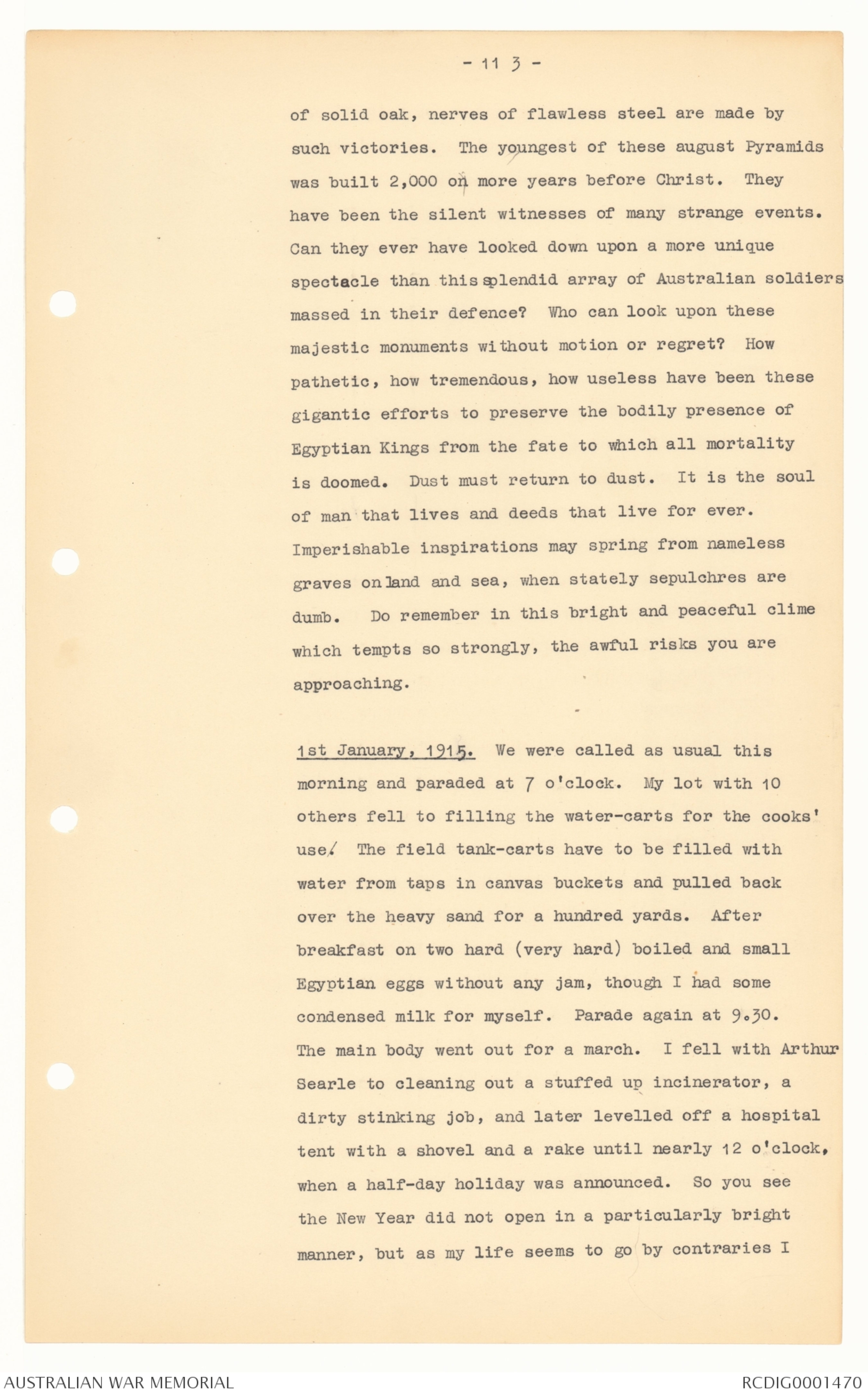
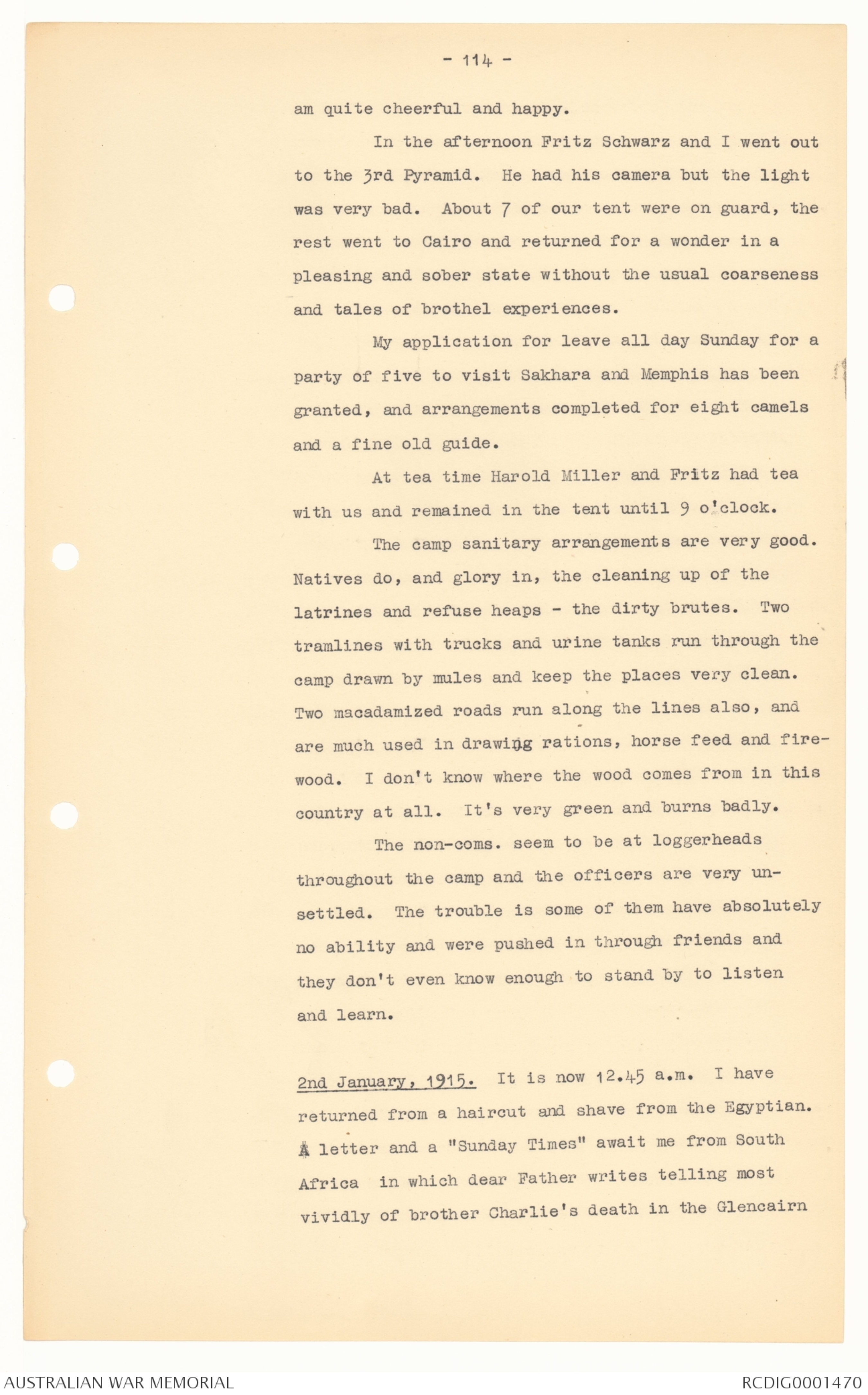
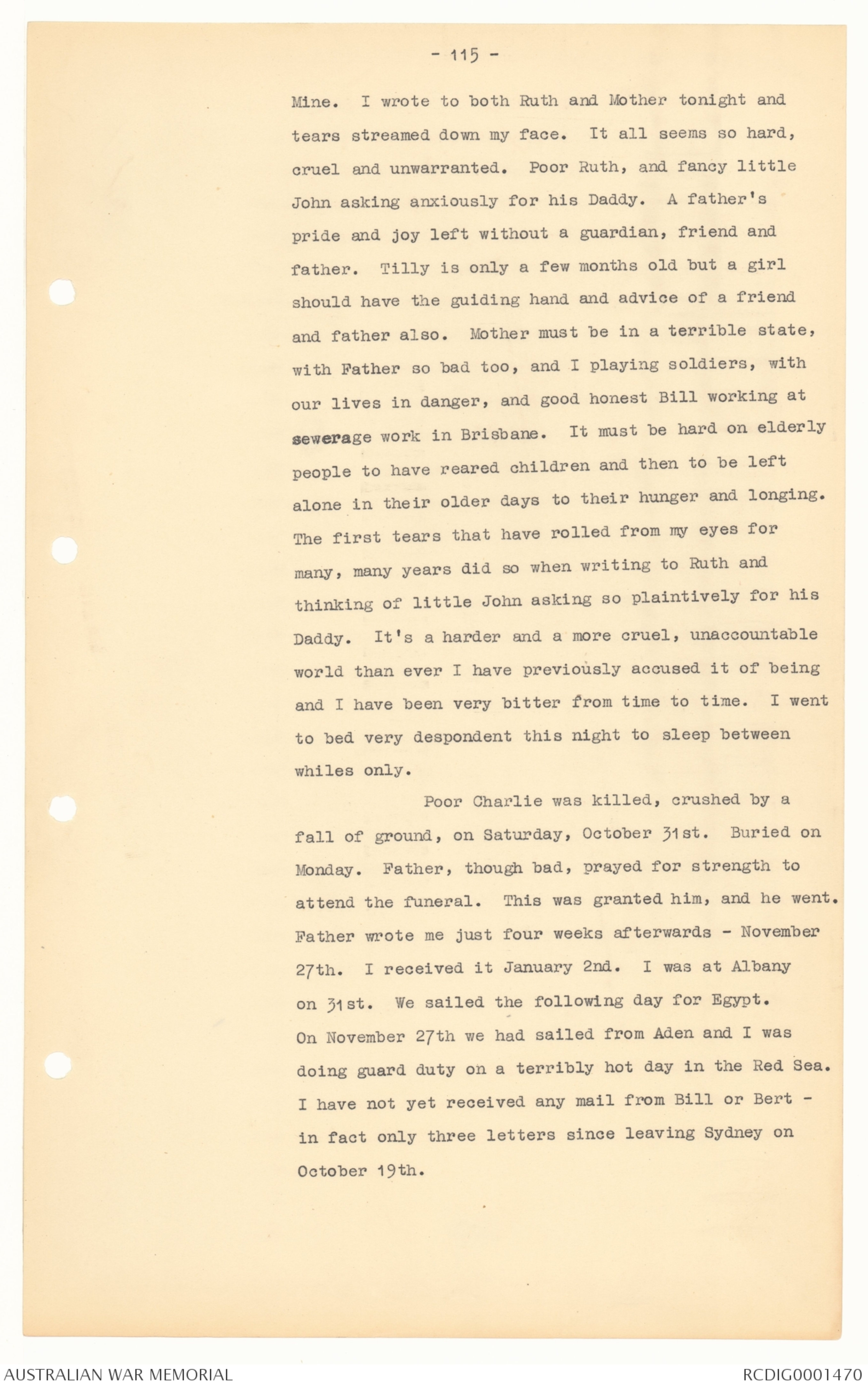
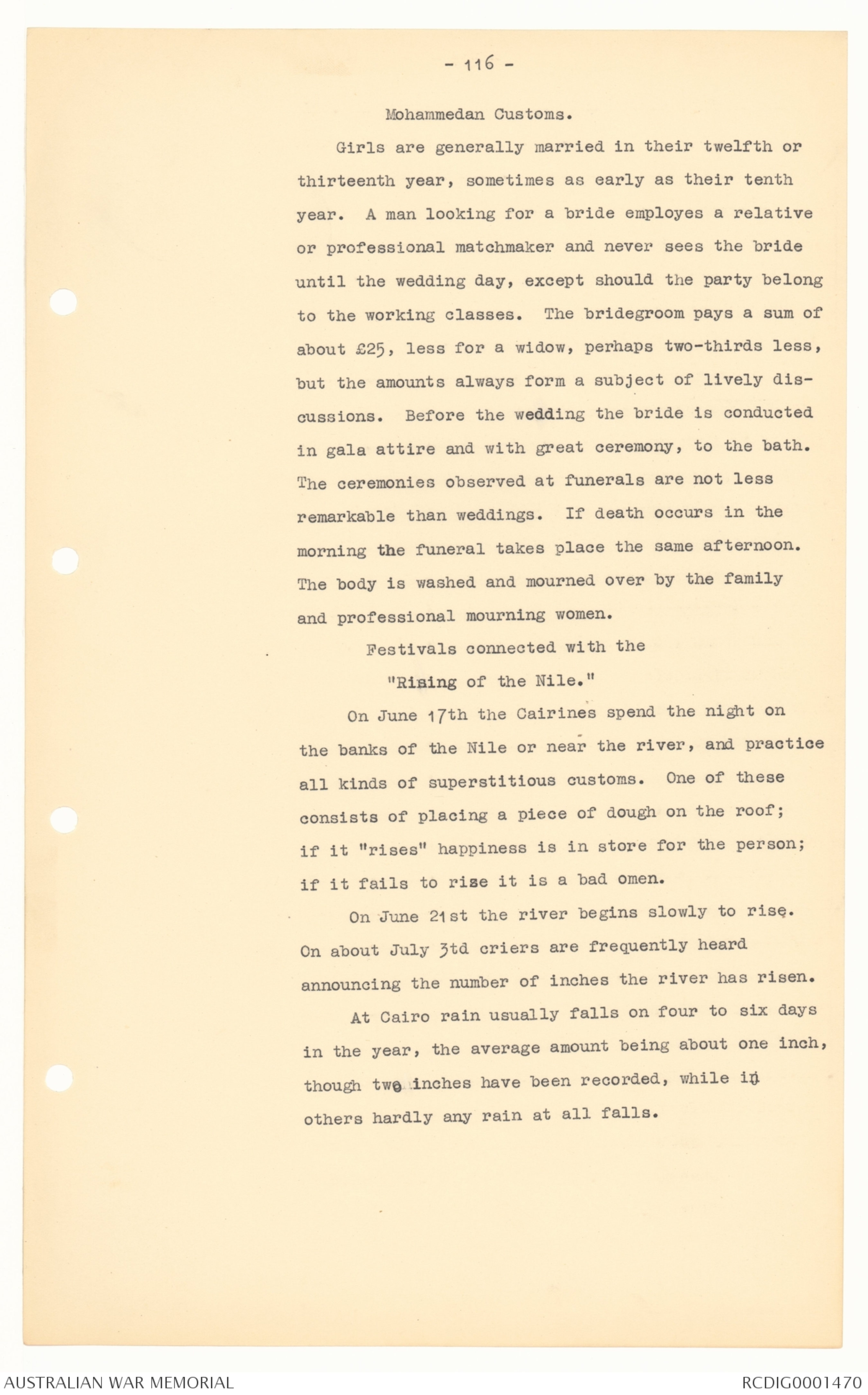
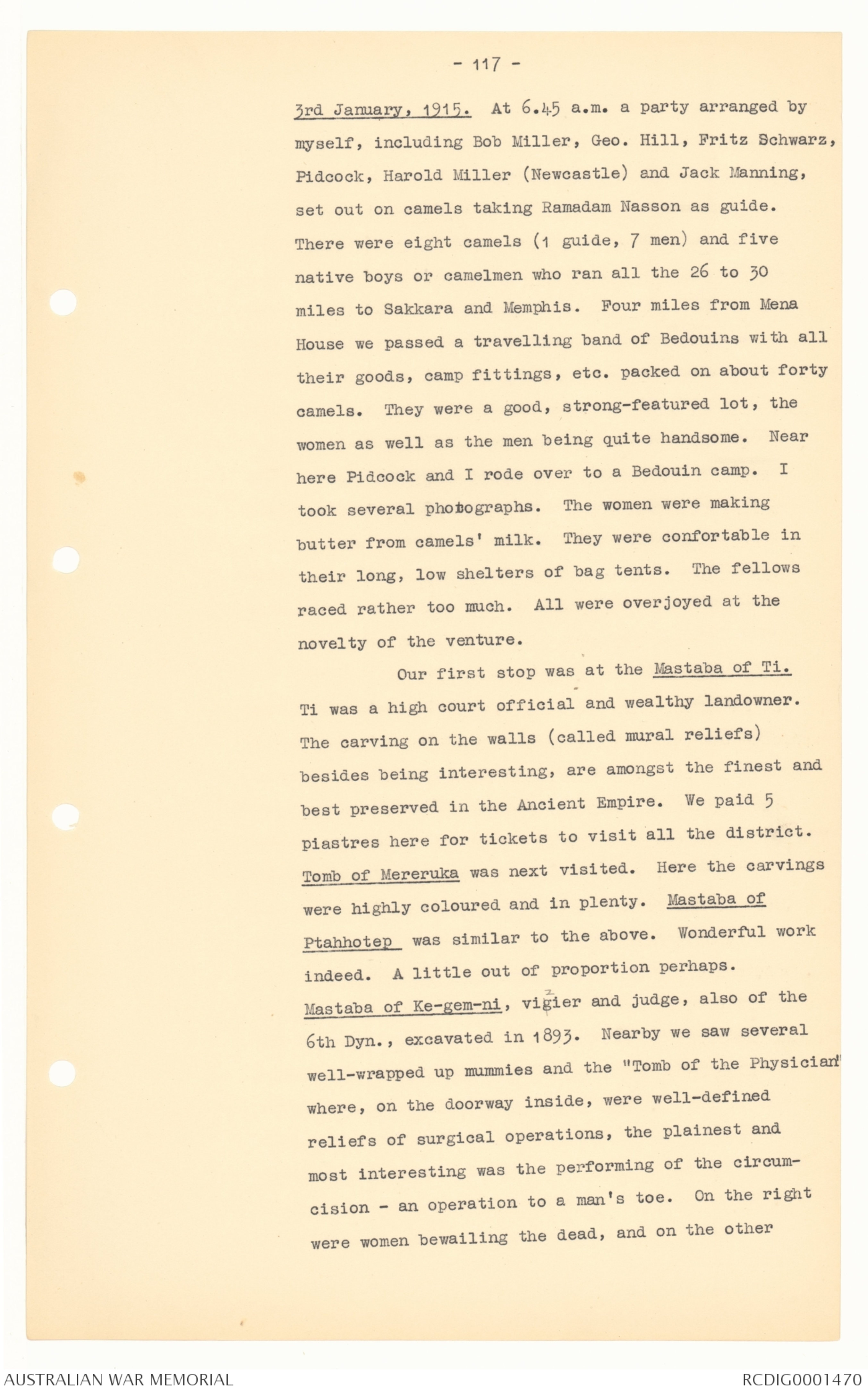
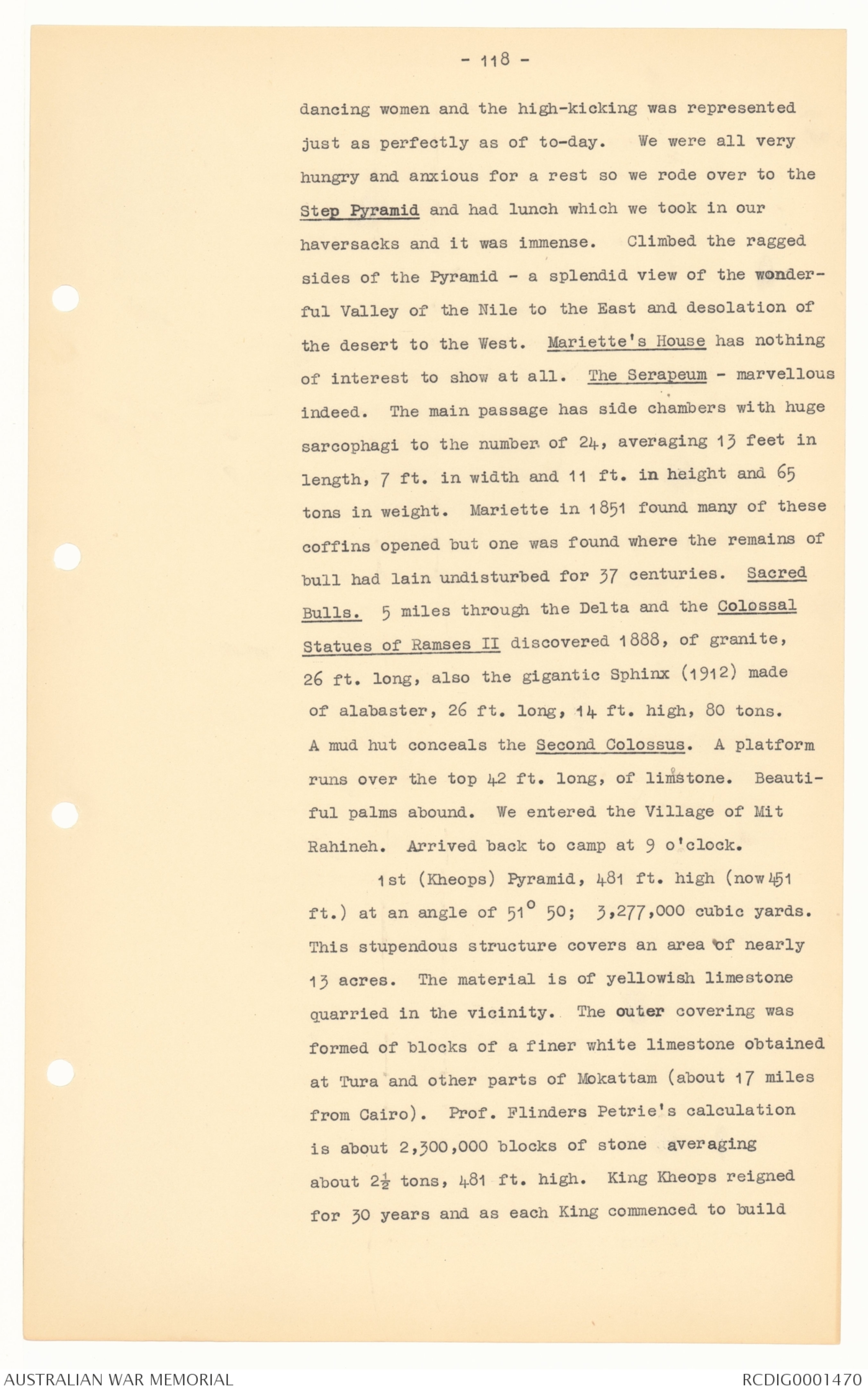
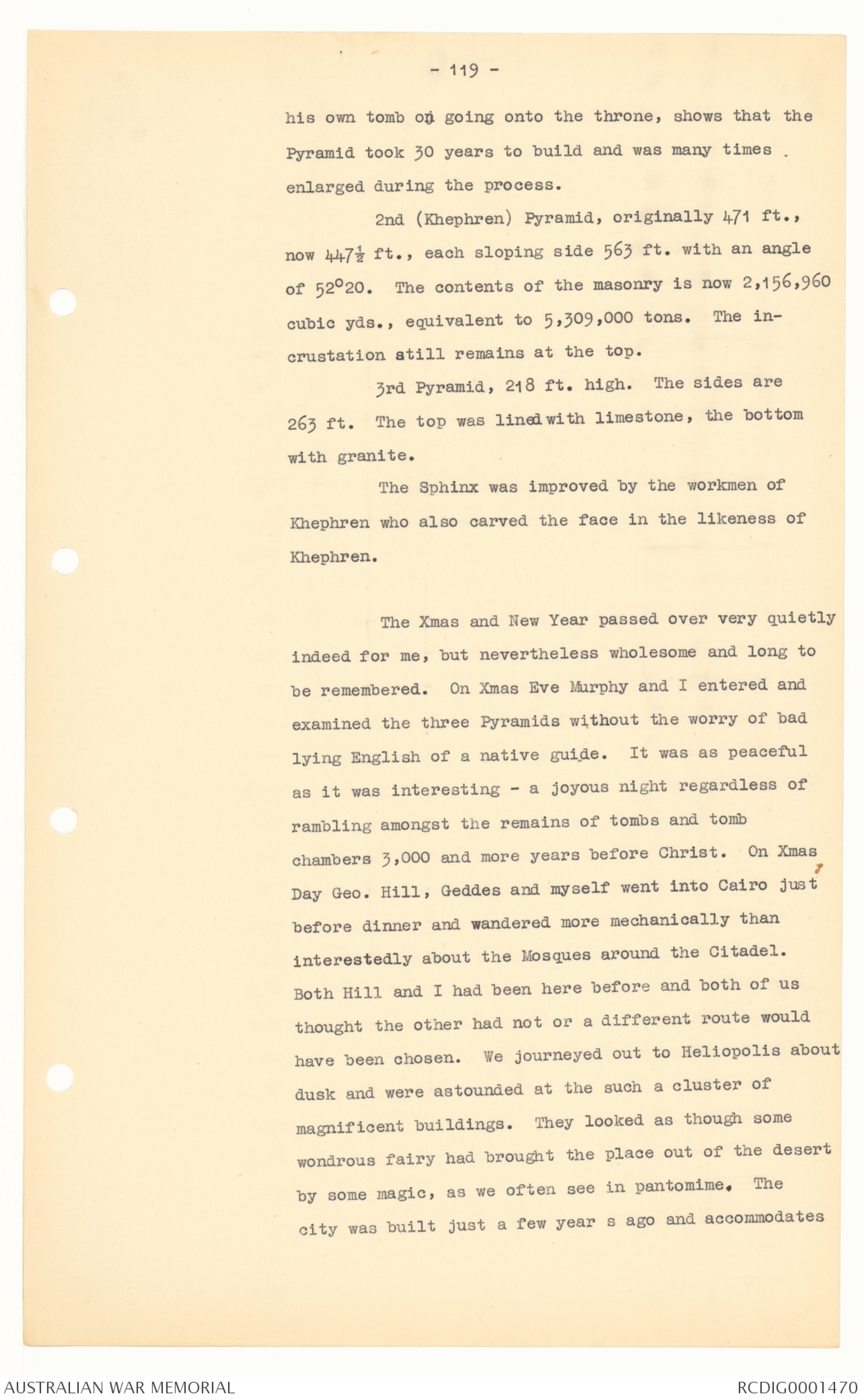
- 110 -
later cut off from their lines of communication by
Abercrombie at Bloukir Bay and his men were left on
the Zibyan Desert to perish of starvation." He
referred to the many sights and scenes which have
taken place within the limits of these silent and
majestic monuments of age.
Pidcock, a splendid young fellow, and I
sat in the tent/talking science versus religion until
after 'lights out' - 10 p.m. The other members of
the tent came in at 11 p.m. talking loudly of their
night in Cairo.
31st December, 1914. It is 10.30 p.m. Con O'Sullivan
sits in the centre in command of a whisky, with an
advisory board sitting around in all sorts of attire,
while 'Sully' holds a big grip of the sometimes funny
conversation but at the present moment they are getting
extremely rough, although Hucking is attempting to
steady matters down.
It is 12 o'clock and our tent is in a
cranky uproar; we who are sober are having a rotten
time. It is now midday on New Year's Eve and may of
our tent are ashamed of themselves, and their behaviour
of last night warrants the self-conviction disgrace.
I rather admire a good drunk at any time providing
they have something to celebrate and go about celebrating
it in a proper way and a frivolous manner.
The wet canteen was closed early in the afternoon,
but not before many of the fellows were drunk. After
parade and a poor tea, this "Baulkham Hills" marmalade
jam, or really oranges boiled in water. Sixpence
a day per man is now allowed on account of proper
rations not being procurable. The Quarter-Master
buys extras to that amount, or is supposed to, but
every man in the camp thinks there is something very
- 111 -
wrong and graft is getting away with the money.
Complaints come from all over the camp regarding the
food. Three large Y.M.C.A. rooms built with Egyptian
mats and without any floors but fitted with long tables
and forms for the fellows to write in; a piano and
magazines are also provided. The Sydney room is 80
ft. by 60 ft. and Mr. Owen, the man in charge, is a
very decent fellow but an awfully poor organiser or at
least he seemed so when he battled along there with a
gang of natives, when had he gone into the battalion
properly plenty of volunteers would have been forth-coming.
The room, anyhow, is a great boom to the men.
At 6 o'clock Bob Miller, Bill Drummond
and I went across sandy flats and mud swamps to get
to the grove of graceful palms, which have worried me
for weeks standing in the distance and looking so
attractive. After a lot of trouble dodging through
freshly-ploughed and wet cultivations we got in
amongst the date palms, and as the moon had not
covered more than half of her journey to the zenith
the palms stood out against the soft girlish moonlight
to perfection. Everything was quiet as we sat
down to listen to the sounds of the night but scarcely
anything could be heard but a few bats. We strolled
on amongst the bewildering irrigation lines and
passed three wheel pumping stations expecting at
every turn to be challenged by a native owner. We
tried to get through to a road along which we saw a
donkey and men walking but mud and water barred
progress, and we had to turn back on to the road
leading out the way we came in. The three of us went
out to get away from the noise of the camp and think
a little in peace. It was just glorious and I think
our minds were so far away, though our eyes saw beauty
everywhere, that we hardly took in the full measure
- 112 -
of the risk we were running away out there on other
people's property in the night.
I had a bottle of lemonade and some biscuits
and wrote a letter to my dear W.T.B. Oh! this woman
does make me think of my duties in life: I feel as
though I must get her but then how are we going to
live in peace and at ease, though I am willing enough
to work surely and like as a man amongst men. To aid
towards this end I should be writing up stuff for
the papers but somehow or other I cannot get the time
and really I never seem to waste, a single minute -
in fact I seldom join in the camp conversations as I
have something always on hand. And again words do
not come freely. I seem very worried indeed. There
is Father probably dead and Mother alone by this time
and my mind runs away to Manly at every turn of thought.
Sir George Reid addressed about half of
our 18,000 men yesterday and another half to-day.
Afterwards a review - Sir George accompanied by
Lieut.-General Sir John Maxwell and Major-General
Bridges, also Mr. McKenzie, High Commissioner of
New Zealand. Sir George opened by a nice piece of
flattery to Sir John Maxwell and all of the officers
of the Expeditionary Force, in which he excelled
himself. After throwing away compliments in his
wonderful and masterly manner, he asked the troops to
remember Lord Kitchener's warning. Do not forget
those in your distant homes that love you. Remember
Australia's fair, untarnished name and honour; she
has given to your keeping in a supreme sense. A few
wrong ones there are sure to be, and these can easily
besmirch the good name of the whole army. Your first
and best victories are those of self-control. Hearts
- 11 3 -
of solid oak, nerves of flawless steel are made by
such victories. The youngest of these august Pyramids
was built 2,000 onr more years before Christ. They
have been the silent witnesses of many strange events.
Can they ever have looked down upon a more unique
spectacle than this splendid array of Australian soldiers
massed in their defence? Who can look upon these
majestic monuments without motion or regret? How
pathetic, how tremendous, how useless have been these
gigantic efforts to preserve the bodily presence of
Egyptian Kings from the fate to which all mortality
is doomed. Dust must return to dust. It is the soul
of man that lives and deeds that live for ever.
Imperishable inspirations may spring from nameless
graves on land and sea, when stately sepulchres are
dumb. Do remember in this bright and peaceful clime
which tempts so strongly, the awful risks you are
approaching.
1st January, 1915. We were called as usual this
morning and paraded at 7 o'clock. My lot with 10
others fell to filling the water-carts for the cooks'
use/. The field tank-carts have to be filled with
water from taps in canvas buckets and pulled back
over the heavy sand for a hundred yards. After
breakfast on two hard (very hard) boiled and small
Egyptian eggs without any jam, though I had some
condensed milk for myself. Parade again at 9.30.
The main body went out for a march. I fell with Arthur
Searle to cleaning out a stuffed up incinerator, a
dirty stinking job, and later levelled off a hospital
tent with a shovel and a rake until nearly 12 o'clock,
when a half-day holiday was announced. So you see
the New Year did not open in a particularly bright
manner, but as my life seems to go by contraries I
- 114 -
am quite cheerful and happy.
In the afternoon Fritz Schwarz and I went out
to the 3rd Pyramid. He had his camera but the light
was very bad. About 7 of our tent were on guard, the
rest went to Cairo and returned for a wonder in a
pleasing and sober state without the usual coarseness
and tales of brothel experiences.
My application for leave all day Sunday for a
party of five to visit Sakhara and Memphis has been
granted, and arrangements completed for eight camels
and a fine old guide.
At tea time Harold Miller and Fritz had tea
with us and remained in the tent until 9 o'clock.
The camp sanitary arrangements are very good.
Natives do, and glory in, the cleaning up of the
latrines and refuse heaps - the dirty brutes. Two
tramlines with trucks and urine tanks run through the
camp drawn by mules and keep the places very clean.
Two macadamized roads run along the lines also, and
are much used in drawing rations, horse feed and firewood.
I don't know where the wood comes from in this
country at all. It's very green and burns badly.
The non-coms, seem to be at loggerheads
throughout the camp and the officers are very unsettled.
The trouble is some of them have absolutely
no ability and were pushed in through friends and
they don't even know enough to stand by to listen
and learn.
2nd January, 1915. It is now 12.45 a.m. I have
returned from a haircut and shave from the Egyptian.
A letter and a "Sunday Times" await me from South
Africa in which dear Father writes telling most
vividly of brother Charlie's death in the Glencairn
- 115 -
Mine. I wrote to both Ruth and Mother tonight and
tears streamed down my face. It all seems so hard,
cruel and unwarranted. Poor Ruth, and fancy little
John asking anxiously for his Daddy. A father's
pride and joy left without a guardian, friend and
father. Tilly is only a few months old but a girl
should have the guiding hand and advice of a friend
and father also. Mother must be in a terrible state,
with Father so bad too, and I playing soldiers, with
our lives in danger, and good honest Bill working at
sewerage work in Brisbane. It must be hard on elderly
people to have reared children and then to be left
alone in their older days to their hunger and longing.
The first tears that have rolled from my eyes for
many, many years did so when writing to Ruth and
thinking of little John asking so plaintively for his
Daddy. It's a harder and a more cruel, unaccountable
world than ever I have previously accused it of being
and I have been very bitter from time to time. I went
to bed very despondent this night to sleep between
whiles only.
Poor Charlie was killed, crushed by a
fall of ground, on Saturday, October 31st. Buried on
Monday. Father, though bad, prayed for strength to
attend the funeral. This was granted him, and he went.
Father wrote me just four weeks afterwards - November
27th. I received it January 2nd. I was at Albany
on 31st. We sailed the following day for Egypt.
On November 27th we had sailed from Aden and I was
doing guard duty on a terribly hot day in the Red Sea.
I have not yet received any mail from Bill or Bert -
in fact only three letters since leaving Sydney on
October 19th.
- 116 -
Mohammedan Customs.
Girls are generally married in their twelfth or
thirteenth year, sometimes as early as their tenth
year. A man looking for a bride employes a relative
or professional matchmaker and never sees the bride
until the wedding day, except should the party belong
to the working classes. The bridegroom pays a sum of
about £25, less for a widow, perhaps two-thirds less,
but the amounts always form a subject of lively discussions.
Before the wedding the bride is conducted
in gala attire and with great ceremony, to the bath.
The ceremonies observed at funerals are not less
remarkable than weddings. If death occurs in the
morning the funeral takes place the same afternoon.
The body is washed and mourned over by the family
and professional mourning women.
Festivals connected with the
"Rising of the Nile."
On June 17th the Cairines spend the night on
the banks of the Nile or near the river, and practice
all kinds of superstitious customs. One of these
consists of placing a piece of dough on the roof;
if it "rises" happiness is in store for the person;
if it fails to rise it is a bad omen.
On June 21st the river begins slowly to rise.
On about July 3td criers are frequently heard
announcing the number of inches the river has risen.
At Cairo rain usually falls on four to six days
in the year, the average amount being about one inch,
though two inches have been recorded, while in
others hardly any rain at all falls.
- 117 -
3rd January, 1915. At 6.45 a.m. a party arranged by
myself, including Bob Miller, Geo. Hill, Fritz Schwarz,
Pidcock, Harold Miller (Newcastle) and Jack Manning,
set out on camels taking Ramadam Nasson as guide.
There were eight camels (1 guide, 7 men) and five
native boys or camelmen who ran all the 26 to 30
miles to Sakkara and Memphis. Four miles from Mena
House we passed a travelling band of Bedouins with all
their goods, camp fittings, etc. packed on about forty
camels. They were a good, strong-featured lot, the
women as well as the men being quite handsome. Near
here Pidcock and I rode over to a Bedouin camp. I
took several photographs. The women were making
butter from camels' milk. They were confortable in
their long, low shelters of bag tents. The fellows
raced rather too much. All were overjoyed at the
novelty of the venture.
Our first stop was at the Mastaba of Ti.
Ti was a high court official and wealthy landowner.
The carving on the walls (called mural reliefs)
besides being interesting, are amongst the finest and
best preserved in the Ancient Empire. We paid 5
piastres here for tickets to visit all the district.
Tomb of Mereruka was next visited. Here the carvings
were highly coloured and in plenty. Mastaba of
Ptahhotep was similar to the above. Wonderful work
indeed. A little out of proportion perhaps.
Mastaba of Ke-gem-ni, vig^zier and judge, also of the
6th Dyn., excavated in 1893. Nearby we saw several
well-wrapped up mummies and the "Tomb of the Physician"
where, on the doorway inside, were well-defined
reliefs of surgical operations, the plainest and
most interesting was the performing of the circumcision -
an operation to a man's toe. On the right
were women bewailing the dead, and on the other
- 118 -
dancing women and the high-kicking was represented
just as perfectly as of to-day. We were all very
hungry and anxious for a rest so we rode over to the
Step Pyramid and had lunch which we took in our
haversacks and it was immense. Climbed the ragged
sides of the Pyramid - a splendid view of the wonderful
Valley of the Nile to the East and desolation of
the desert to the West. Mariette's House has nothing
of interest to show at all. The Serapeum - marvellous
indeed. The main passage has side chambers with huge
sarcophagi to the number of 24, averaging 13 feet in
length, 7 ft. in width and 11 ft. in height and 65
tons in weight. Mariette in 1851 found many of these
coffins opened but one was found where the remains of
bull had lain undisturbed for 37 centuries. Sacred
Bulls. 5 miles through the Delta and the Colossal
Statues of Ramses II discovered 1888, of granite,
26 ft. long, also the gigantic Sphinx (1912) made
of alabaster, 26 ft. long, 14 ft. high, 80 tons.
A mud hut conceals the Second Colossus. A platform
runs over the top 42 ft. long, of lim^estone. Beautiful
palms abound. We entered the Village of Mit
Rahineh. Arrived back to camp at 9 o'clock.
1st (Kheops) Pyramid, 481 ft. high (now 451
ft.) at an angle of 51o 50; 3,277,000 cubic yards.
This stupendous structure covers an area of nearly
13 acres. The material is of yellowish limestone
quarried in the vicinity. The outer covering was
formed of blocks of a finer white limestone obtained
at Tura and other parts of Mokattam (about 17 miles
from Cairo). Prof. Flinders Petrie's calculation
is about 2,300,000 blocks of stone averaging
about 2½ tons, 481 ft. high. King Kheops reigned
for 30 years and as each King commenced to build
- 119 -
his own tomb on going onto the throne, shows that the
Pyramid took 30 years to build and was many times
enlarged during the process.
2nd (Khephren) Pyramid, originally 471 ft.,
now 447½ ft., each sloping side 563 ft. with an angle
of 52o 20. The contents of the masonry is now 2,156,960
cubic yds., equivalent to 5,309,000 tons. The incrustation
still remains at the top.
3rd Pyramid, 218 ft. high. The sides are
263 ft. The top was lined with limestone, the bottom
with granite.
The Sphinx was improved by the workmen of
Khephren who also carved the face in the likeness of
Khephren.
The Xmas and New Year passed over very quietly
indeed for me, but nevertheless wholesome and long to
be remembered. On Xmas Eve Murphy and I entered and
examined the three Pyramids without the worry of bad
lying English of a native guide. It was as peaceful
as it was interesting - a joyous night regardless of
rambling amongst the remains of tombs and tomb
chambers 3,000 and more years before Christ. On Xmas
Day Geo. Hill, Geddes and myself went into Cairo just
before dinner and wandered more mechanically than
interestedly about the Mosques around the Citadel.
Both Hill and I had been here before and both of us
thought the other had not or a different route would
have been chosen. We journeyed out to Heliopolis about
dusk and were astounded at the such a cluster of
magnificent buildings. They looked as though some
wondrous fairy had brought the place out of the desert
by some magic, as we often see in pantomime. The
city was built just a few year s ago and accommodates
 Not Yet Replaced By AI
Not Yet Replaced By AIThis transcription item is now locked to you for editing. To release the lock either Save your changes or Cancel.
This lock will be automatically released after 60 minutes of inactivity.